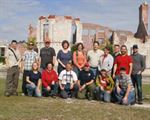
 UC Merced is one of six universities that are part of a certificate program to develop forward-thinking leaders who will manage public lands through 21st-century challenges.
UC Merced is one of six universities that are part of a certificate program to develop forward-thinking leaders who will manage public lands through 21st-century challenges.
The Leadership for Public Lands and Cultural Heritage Certificate comprises six graduate-level courses and is accepting applications for the 2012-13 academic year. The deadline to apply is April 1.
“Public lands face challenges that are unique, in that they require a holistic view of how to address key management problems,” UC Merced management Professor Erik Rolland said. “Such challenges cannot be addressed in isolation. They require a unique and broad cross-functional view of the world in which we live.
“The key is to get the students — typically managers of national parks — to think outside the box by exposing them to a wide range of ideas.”
The program is looking to attract National Park Service employees at Yosemite National Park and other nearby parks along with other interested students. The program is particularly useful to those who are currently employed, and particularly in the areas of parks and cultural heritage.
The managers of the world’s public lands must grapple with diverse and changing challenges, including climate change and invasive species that can undermine the ecosystem, Rolland said. The interdisciplinary program has faculty with backgrounds in public policy, management science, ecology and natural resources management. They hail from UC Merced, Colorado State University, Indiana University, George Washington University, Clemson University and the University of Vermont.
The students in the class learn how to bridge the social, administrative, political and natural sciences.
UC Merced also is home of the National Parks Institute, which includes the Executive Leadership Seminar, a 12-day intensive management seminar on leadership, innovation and organizational renewal for park and protected-area leaders.
The Leadership for Public Lands and Cultural Heritage Certificate has six courses:
- Leadership and Relevancy in the 21st Century;
- Organizational Leadership for Parks and Public Lands;
- Human Dimensions of Outdoor Recreation and Public Land Visitation;
- Public and Nonprofit Program Evaluation;
- Integrated Public Lands Resource Management; and
- Protected Area Law and Policy.
Courses are taught primarily online, though there is also a three-week residential component designed to bring theory into practice in public lands-based settings using leadership frameworks to address current and emerging issues. The online program allows professionals to participate from anywhere they are stationed while remaining engaged in each course through interactive discussions, thought-provoking readings and collaborative projects.
The curriculum has been designed for emerging leaders within the National Park Service, Bureau of Land Management, Fish and Wildlife Service, Forest Service, Environmental Protection Agency, state and local park and fish and wildlife agencies, public land nonprofits, and cultural and natural resource organizations.
The certificate’s first cohort is set to graduate in May. The group consists of 14 National Park Service employees, representing experience in 42 National Park Units including interpretation, law enforcement, outreach and administration.
Student Mike Bachofen, a contracts officer from the Intermountain Regional Office in Lakewood, Colo., said the cohort’s diversity from the National Park Service gave him “a sense of the broader outlook, everyone’s role and how it all comes together.”






